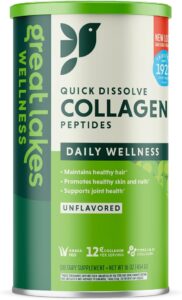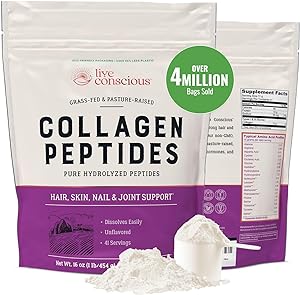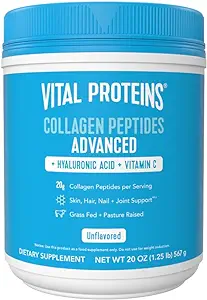Collagen Peptides: Enhancing Skin, Hair, and Joint Health
Introduction
Collagen, the most abundant protein in the human body, plays a crucial role in maintaining the structure and integrity of various tissues, including skin, hair, and joints. As we age, the natural production of collagen declines, leading to visible signs of aging such as wrinkles, sagging skin, brittle hair, and joint discomfort. To counter these effects, many people turn to collagen peptides, a supplement that promises to boost collagen levels and promote overall health. This article explores the science behind collagen peptides, their benefits, and how they can enhance skin, hair, and joint health.
What Are Collagen Peptides?
Understanding Collagen
Collagen is a fibrous protein composed of amino acids, primarily glycine, proline, and hydroxyproline. It provides structural support to connective tissues, such as skin, tendons, ligaments, and bones. There are at least 16 types of collagen, but types I, II, and III are the most prevalent in the human body.
Collagen Peptides: A Breakdown
Collagen peptides, also known as hydrolyzed collagen, are a form of collagen broken down into smaller, more easily absorbed molecules. Peptides are highly bioavailable thanks to this hydrolysis process, which allows for their quick absorption into the bloodstream and effective use by the body.
The Science Behind Collagen Peptides
Bioavailability and Absorption
The hydrolysis process converts collagen into smaller peptides, which are more readily absorbed through the digestive tract. Once ingested, these peptides are transported to various tissues, where they stimulate the production of new collagen and support the repair and maintenance of existing collagen structures.
Mechanisms of Action
Collagen peptides exert their effects through several mechanisms:
- Stimulation of Collagen Synthesis: The presence of collagen peptides in the bloodstream signals fibroblasts (collagen-producing cells) to increase collagen production.
- Reduction of Collagen Degradation: Collagen peptides inhibit the activity of enzymes that break down collagen, preserving the existing collagen matrix.
- Providing Building Blocks: Collagen peptides supply the amino acids necessary for collagen synthesis, supporting the maintenance and repair of connective tissues.
Benefits of Collagen Peptides
Enhancing Skin Health
Improving Skin Elasticity and Hydration
Collagen peptides have been shown to improve skin elasticity and hydration, which are essential for maintaining a youthful appearance. Studies suggest that regular supplementation can reduce wrinkles and fine lines, enhance skin firmness, and promote a healthy glow.
Reducing Signs of Aging
The decline in collagen production with age leads to wrinkles and sagging skin. Collagen peptides help combat these signs of aging by replenishing the skin’s collagen stores and supporting the structural integrity of the skin.
Promoting Hair Health
Strengthening Hair
Hair is primarily composed of keratin, a protein that relies on collagen for its strength and structure. Collagen peptides support hair health by providing the amino acids necessary for keratin production, resulting in stronger, less brittle hair.
Enhancing Hair Growth
Collagen peptides can also promote hair growth by improving the health of the scalp and hair follicles. A healthy scalp provides a better environment for hair growth, leading to thicker and more resilient hair.
Supporting Joint Health
Reducing Joint Pain and Inflammation
Collagen is a vital component of cartilage, the tissue that cushions joints and allows for smooth movement. Collagen peptides help maintain cartilage health, reducing joint pain and inflammation associated with conditions like osteoarthritis.
Enhancing Joint Mobility and Flexibility
By supporting the repair and regeneration of cartilage, collagen peptides improve joint mobility and flexibility, enabling better physical performance and a more active lifestyle.
How to Incorporate Collagen Peptides into Your Routine
Choosing the Right Supplement
When selecting a collagen peptide supplement, consider the following factors:
- Source: Collagen peptides can be derived from bovine, porcine, or marine sources. Choose a source that aligns with your dietary preferences and any potential allergies.
- Type of Collagen: Look for supplements that contain type I and III collagen for skin and hair health and type II collagen for joint health.
- Quality: Opt for high-quality, third-party-tested supplements to ensure purity and potency.
Dosage and Timing
The optimal dosage of collagen peptides varies depending on individual needs and the specific health benefits desired. Generally, a daily dose of 2.5 to 15 grams is recommended. Collagen peptides can be taken at any time of day, but some studies suggest taking them with meals for better absorption.
Ways to Consume Collagen Peptides
Collagen peptides are versatile and can be easily incorporated into your diet. They are available in various forms, including powders, capsules, and liquids. Here are some creative ways to consume collagen peptides:
- Mix into Beverages: Add collagen peptide powder to smoothies, coffee, or tea.
- Blend with Foods: Incorporate collagen peptides into yogurt, oatmeal, or soups.
- Baking: Use collagen peptides in baking recipes, such as protein bars, muffins, or pancakes.
Potential Side Effects and Precautions
Safety and Tolerability
Collagen peptides are generally considered safe for most people. However, it’s essential to follow the recommended dosage and consult with a healthcare professional before starting any new supplement, especially if you have underlying health conditions or are pregnant or breastfeeding.
Possible Side Effects
While side effects are rare, some individuals may experience mild digestive issues, such as bloating or diarrhea. If you experience any adverse reactions, discontinue use and consult a healthcare provider.
Frequently Asked Questions (FAQs)
1. What are collagen peptides?
Collagen peptides are small, bioavailable protein fragments derived from the hydrolysis of collagen, which is the main structural protein in connective tissues.
2. How do collagen peptides differ from regular collagen?
Regular collagen consists of large, intact protein molecules that are difficult for the body to absorb. Collagen peptides, on the other hand, are broken down into smaller peptides, making them more easily absorbed and utilized by the body.
3. What are the benefits of taking collagen peptides?
Collagen peptides support skin elasticity and hydration, reduce wrinkles, strengthen hair, promote hair growth, reduce joint pain and inflammation, and enhance joint mobility and flexibility.
4. How long does it take to see results from collagen peptides?
Results vary depending on the individual and the specific health benefit desired. Generally, noticeable improvements in skin and hair health can be seen within 4 to 8 weeks, while joint health benefits may take 2 to 6 months.
5. Can collagen peptides help with weight loss?
Collagen peptides are not specifically designed for weight loss. However, they can support overall health and wellness, which may indirectly contribute to a healthy weight when combined with a balanced diet and regular exercise.
6. Are collagen peptides safe to use during pregnancy?
While collagen peptides are generally considered safe, pregnant or breastfeeding women should consult with a healthcare provider before starting any new supplement.
7. Can collagen peptides cause allergic reactions?
Collagen peptides derived from common allergens, such as fish or shellfish, may cause allergic reactions in sensitive individuals. Choose a source that aligns with your dietary restrictions and allergies.
8. How should I store collagen peptides?
Store collagen peptides in a cool, dry place, away from direct sunlight and moisture. Follow the storage instructions on the product label for the best results.
9. Can vegetarians or vegans use collagen peptides?
Most collagen peptides are derived from animal sources. Vegetarians and vegans can opt for plant-based collagen boosters, which contain ingredients that support the body’s natural collagen production.
10. What is the recommended daily dosage of collagen peptides?
The optimal dosage varies depending on individual needs and the specific health benefits desired. Generally, a daily dose of 2.5 to 15 grams is recommended.
11. Can I take collagen peptides with other supplements?
Collagen peptides can be safely combined with most other supplements. However, consult with a healthcare provider to ensure there are no interactions with any medications or supplements you are currently taking.
12. Are there any side effects associated with collagen peptides?
Collagen peptides are generally well-tolerated. Some individuals may experience mild digestive issues, such as bloating or diarrhea. If you experience any adverse reactions, discontinue use and consult a healthcare provider.
13. Can collagen peptides improve gut health?
Collagen peptides contain amino acids that support the health of the gut lining, potentially aiding in the management of conditions like leaky gut syndrome.
14. How do collagen peptides support athletic performance?
Collagen peptides support joint health, reduce inflammation, and aid in muscle recovery, making them beneficial for athletes and individuals with active lifestyles.
15. Are there any interactions between collagen peptides and medications?
Collagen peptides are generally safe to use with most medications. However, consult with a healthcare provider to ensure there are no potential interactions with any medications you are taking.
16. Can collagen peptides help with bone health?
Collagen peptides provide the necessary amino acids for the production of collagen in bones, potentially supporting bone density and reducing the risk of fractures.
17. What is the best time of day to take collagen peptides?
Collagen peptides can be taken at any time of day. Some studies suggest taking them with meals for better absorption.
18. Can collagen peptides improve nail health?
Yes, collagen peptides can strengthen nails, reduce brittleness, and promote faster growth.
19. Do collagen peptides contain calories?
Yes, collagen peptides contain calories, primarily from protein. The calorie content varies depending on the serving size and product formulation.
20. How long should I take collagen peptides to maintain their benefits?
To maintain the benefits of collagen peptides, consider incorporating them into your daily routine long-term. Consistent use is key to supporting overall skin, hair, and joint health.
Conclusion
Collagen peptides offer a promising solution for enhancing skin, hair, and joint health. Their high bioavailability and ability to stimulate collagen synthesis make them an effective supplement for combating the signs of aging and supporting overall wellness. By understanding the science behind collagen peptides and incorporating them into a balanced diet and healthy lifestyle, individuals can enjoy a range of benefits, from improved skin elasticity and hydration to stronger hair and healthier joints. Always consult with a healthcare professional before starting any new supplement regimen to ensure it aligns with your individual health needs and goals.












One Comment